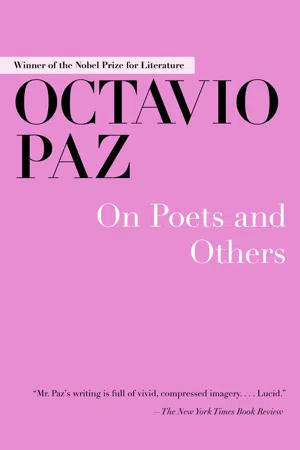
- 240 pages
- English
- ePUB (mobile friendly)
- Available on iOS & Android
On Poets and Others
About this book
The Nobel Prize–winning poet and man of letters Octavio Paz was also a brilliant reader of other writers, and this book selects his best critical essays from over three decades. In the sixteen pieces collected here, Paz discusses a wide range of poets and writers, both American and international, from Robert Frost and Walt Whitman to William Carlos Williams; from Fyodor Dostoevsky to Luis Buñuel to Alexander Solzhenitsyn; and from Charles Baudelaire to Jean-Paul Sartre, André Breton, and Henri Michaux.Paz writes, "I believe that a writer's attitude to language should be that of a lover: fidelity and, at the same time, a lack of respect for the beloved object. Veneration and transgression." When this original thinker meets these writers, each essay is an adventure of the mind.
Trusted by 375,005 students
Access to over 1 million titles for a fair monthly price.
Study more efficiently using our study tools.
Information
Table of contents
- Cover
- Dedication
- Title Page
- Copyright
- Contents
- Foreword
- Robert Frost: Visit to a Poet
- Walt Whitman
- William Carlos Williams: The Saxifrage Flower
- The Graphics of Charles Tomlinson: Black and White
- Jean-Paul Sartre: A Memento
- Baudelaire as Art Critic: Presence and Present
- André Breton, or the Search for the Beginning
- Henri Michaux
- Dostoevski: The Devil and the Ideologue
- Considering Solzhenitsyn: Dust After Mud
- Gulag: Between Isaiah And Job
- José Ortega Y Gasset: The Why and the Wherefore
- Luis Buñuel: Three Perspectives
- Jorge Guillén
- Two Notes On José Revueltas: Christianity and Revolution
- Luis Cernuda: The Edifying Word
Frequently asked questions
- Essential is ideal for learners and professionals who enjoy exploring a wide range of subjects. Access the Essential Library with 800,000+ trusted titles and best-sellers across business, personal growth, and the humanities. Includes unlimited reading time and Standard Read Aloud voice.
- Complete: Perfect for advanced learners and researchers needing full, unrestricted access. Unlock 1.4M+ books across hundreds of subjects, including academic and specialized titles. The Complete Plan also includes advanced features like Premium Read Aloud and Research Assistant.
Please note we cannot support devices running on iOS 13 and Android 7 or earlier. Learn more about using the app